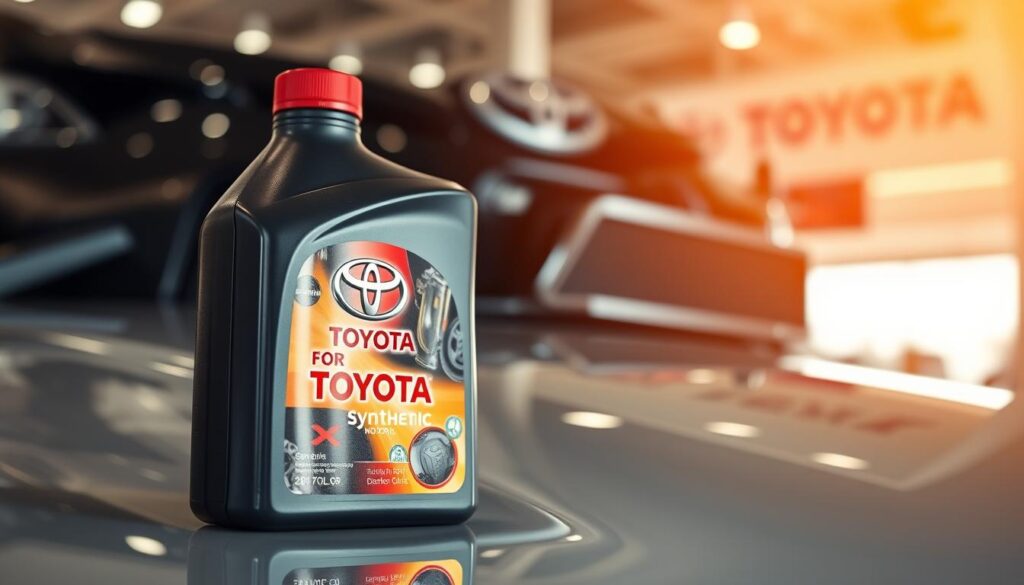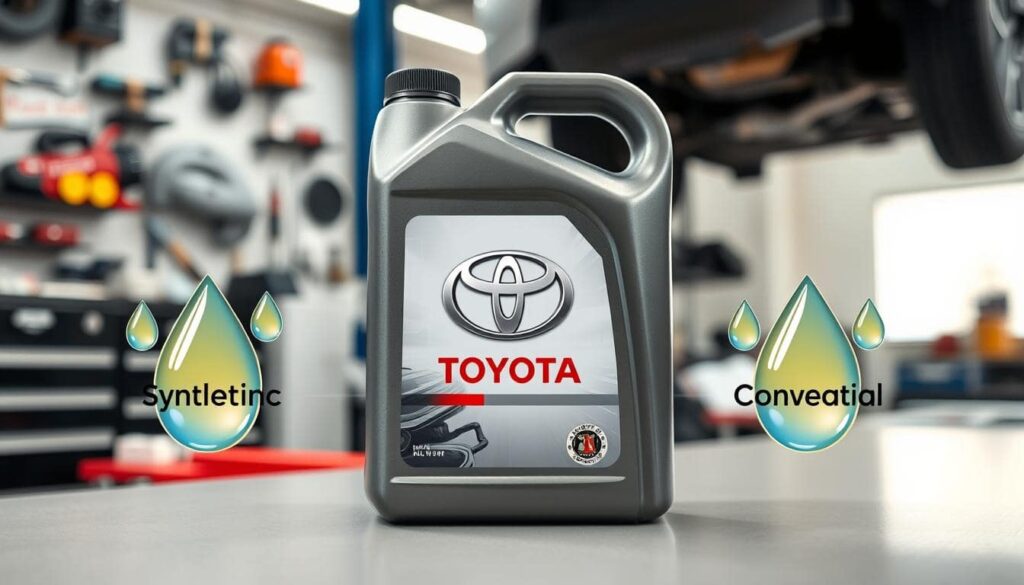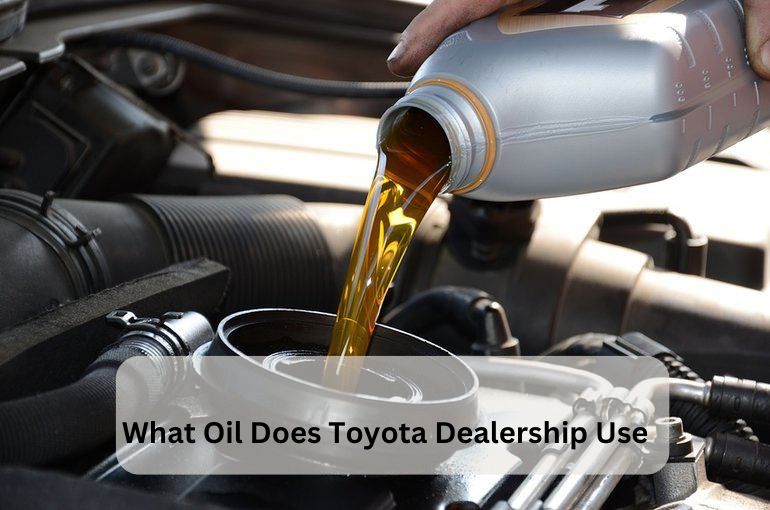Toyota dealerships commonly use Toyota Genuine Motor Oil or Mobil 1 for oil changes. This oil helps keep your Toyota’s engine clean, smooth, and reliable. It meets Toyota’s quality standards and provides reliable protection and performance for most Toyota models.
Stay tuned as we explore “What Oil Does Toyota Dealership Use?” We’ll explore everything you need to know about the oils Toyota dealerships use to keep your engine running smoothly!
Types of Oil Toyota Dealerships Typically Use:
Toyota dealerships commonly use the following types of oil:
- Toyota Genuine Motor Oil (TGMO): This high-quality synthetic oil specially formulated for Toyota vehicles provides excellent engine protection and efficiency.
- Mobil 1 Synthetic Oil: Many dealerships use Mobil 1 for its advanced formula, which offers enhanced engine protection, performance, and longevity.
- Conventional Oil: Some dealerships use traditional oil for older models or specific recommendations, though synthetic options are often preferred.
- Blended Oil (Semi-Synthetic): This is a mix of synthetic and conventional oil, providing a balance of performance and cost.
Benefits of Using Toyota-Recommended Oil:

Using Toyota-recommended oil for your vehicle has multiple benefits. It’s also easy to keep your engine healthy and running well. Let’s explore the main reasons why sticking to Toyota’s recommended oil makes a difference.
1. Enhanced Engine Protection:
Toyota-recommended oils, like Toyota Genuine Motor Oil (TGMO) and Mobil 1, are specially designed to protect your engine. Engineers make them to handle heat, pressure, and wear. Enhanced engine protection means your engine parts will only wear out slowly, so you will avoid unexpected wear. Using the correct oil ensures the metal parts inside the engine are lubricated, reducing friction and preventing damage over time.
2. Improved Fuel Efficiency:
When your engine works smoothly, it requires less fuel. Toyota formulates recommended oils to minimize friction, making it easier for your engine to perform at its best without using extra fuel. Over time, you can save Money on gas and reduce the number of stops you make at the gas station.
3. Longer Engine Life:
Choosing the oil Toyota recommends can extend your engine’s life. Since Toyota tailors its oils for your vehicle’s engine, they provide reliable lubrication under all conditions, like cold starts or long drives. It helps your car run smoothly and reduces the likelihood of engine breakdowns, keeping your vehicle on the road longer.
4. Warranty Protection:
If your car is still under warranty, using Toyota-recommended oil can keep that warranty valid. Following the manufacturer’s oil recommendation ensures you meet all the requirements for warranty coverage. If you decide to use other oils, you may risk voiding the warranty, which could be costly if repairs are needed.
5. Cleaner Engine and Less Sludge:
Over time, dirt and sludge can build up in engines, especially if someone doesn’t replace the oil regularly or uses low-quality oil. Toyota-recommended oils include cleaning agents to reduce this buildup, keeping the engine cleaner. A cleaner engine performs better and is less likely to develop problems, helping your car last longer.
6. Better Performance in Extreme Temperatures:
Toyota recommended that the oil design handle various temperatures, from cold to scorching hot. Whether you live in a region with extreme winters or hot summers, the oil maintains its viscosity (thickness) and protects your engine. This adaptability means you can rely on Toyota oil no matter the climate.
7. Reduced Carbon Footprint:
Using the right oil can make your engine more fuel-efficient, meaning less fuel consumption and fewer emissions. With Toyota-recommended oil, your vehicle will produce less exhaust and reduce harmful environmental impacts. Using Toyota oil can be a small but effective step for those looking to make environmentally friendly choices.
8. Recommended by Toyota Engineers:
Toyota engineers have spent years testing oils to find the best engine formulas. They know exactly how each engine part works and what it needs to stay in top shape. Using Toyota-recommended oil means you’re trusting the expertise of the people who designed your car, making it a smart choice for long-term performance.
How to Choose the Right Oil for Your Toyota Vehicle?
Choosing the right oil for your Toyota vehicle is important to keep your engine running smoothly and efficiently. With so many types of oil available, it can seem confusing to know which one to pick. Here’s a simple guide to help you choose the best oil for your Toyota.
1. Check Your Toyota Owner’s Manual:
The easiest way to find the right oil is to look in your Toyota owner’s manual. This manual lists the specific oil type and grade that works best for your car’s engine. Toyota provides detailed guidelines to ensure you use the oil designed for your car’s needs.
2. Understand Oil Types: Synthetic vs. Conventional

There are two main types of engine oil:
- Synthetic Oil: Engineers design synthetic oil to offer more protection and perform well in hot and cold temperatures. It also lasts longer, so you don’t need to change it as often. Most new Toyota models use synthetic oil for better engine performance.
- Conventional Oil: Conventional oil is more basic and works well for older vehicles or engines that don’t require high-performance oil. However, it may need to be changed more frequently than synthetic oil.
Most experts recommend synthetic oil for Toyotas. It keeps the engine cleaner, helps fuel efficiency, and provides better protection over time.
Read More:
3. Select the Right Viscosity Grade (Thickness):
Engine oil has a specific viscosity grade, such as 5W-30 or 0W-20. Viscosity refers to how thick or thin the oil is, especially at different temperatures. The numbers in the grade show how the oil flows in cold and hot conditions:
- The first number (e.g., 5 in 5W-30) shows how the oil performs in winter (cold) temperatures.
- The second number (e.g., 30 in 5W-30) shows how the oil performs in hot temperatures.
For example, many Toyota models recommend 0W-20 oil, which flows easily in cold weather and protects the engine in hot weather. Always use the viscosity grade suggested by Toyota for your specific model, as using the wrong one can affect engine performance and fuel efficiency.
4. Consider Toyota Genuine Motor Oil (TGMO):
Toyota Genuine Motor Oil (TGMO) is specially designed for Toyota engines. This oil ensures your car’s best protection, cleanliness, and performance, meeting Toyota’s high standards. (TGMO) can help keep your engine in top condition, and Toyota dealerships often recommend it.
5. Think About Your Driving Conditions:
Your driving habits and environment also affect your oil choice. If you:
- Drive in Extreme Temperatures: Synthetic oils work better in extreme hot or cold temperatures, maintaining viscosity than conventional oils.
- Drive in Heavy Traffic: Stop-and-go driving in traffic or long idling times can put extra stress on your engine. In these cases, synthetic oil may offer better protection.
- Tow Heavy Loads: If you use your Toyota to tow or haul, synthetic oil can provide more protection under the extra weight and pressure on the engine.
Considering these factors, you can choose an oil that provides optimal protection based on how and where you drive.
6. Look for Quality Oil Brands:
Choosing a quality oil brand, like Mobil 1, Castrol, or Toyota Genuine Motor Oil, ensures you’re using oil that meets high standards. Many car manufacturers and Toyota dealerships trust these brands because they offer excellent engine protection and performance.
7. Follow Regular Oil Change Intervals:
Using the right oil is important, but so is changing it on time. Toyota recommends regular oil changes based on mileage or time, even if you’re using high-quality synthetic oil. Your owner’s manual will show the recommended interval, typically around every 5,000 to 10,000 miles, depending on your vehicle model and driving conditions.
8. Ask a Toyota Technician for Advice:
If you need more information, ask a technician at your Toyota dealership. They know the specifics of Toyota engines and can help you choose the best oil for your vehicle. They can also check your oil levels, change them, and ensure your engine stays well-maintained.
Toyota Dealership Oil Change Process:

1. Vehicle Check-In:
When you arrive at the Toyota dealership, a service advisor will greet you and check in your vehicle. They’ll ask for details like your car’s model, the type of oil you want, and any special concerns you have. This step helps the advisor understand your vehicle’s needs and ensures you get the correct oil and service.
2. Pre-Service Inspection for Safety:
Before starting the oil change, the technician quickly inspects key areas, including fluid levels, tire pressure, and brakes. This inspection helps spot potential issues that might need fixing and ensures your vehicle is safe.
3. Draining the Old Oil:
Next, the technician raises the car using a lift to access the oil drain plug under the engine. They carefully remove the plug and allow the old oil to drain out. Draining the old oil helps clear out dirt, metal particles, and other debris that may have built up over time, giving your engine a fresh start.
4. Replacing the Oil Filter:
The technician will then replace the oil filter. This is an essential step, as the oil filter helps remove impurities from the oil, keeping it clean as it circulates through the engine. Toyota dealerships use Toyota-approved filters designed to fit perfectly and provide adequate filtration for Toyota engines.
5. Adding Fresh, Toyota-Recommended Oil:
Once the old oil is drained and the filter is replaced, it’s time to add new oil. The technician fills your engine with Toyota-recommended oil, designed to offer the best performance for your car’s specific model. This oil provides proper lubrication, protects engine parts, and helps improve fuel efficiency.
6. Conducting a Multi-Point Inspection:
Many Toyota dealerships offer a complimentary multi-point inspection along with the oil change. During this inspection, the technician checks important components, such as:
- Brake pads and rotors to ensure safe braking.
- Tires for wear and proper inflation.
- Battery for any signs of corrosion or weakness.
- Belts and hoses for cracks or wear.
- Fluid levels include coolant, brake fluid, and transmission fluid.
This inspection helps catch minor issues before they become big problems, adding extra value to your visit.
7. Resetting the Maintenance Light:
After the oil change and inspection, the technician resets the maintenance light on your dashboard. This light reminds you of your following oil change and ensures you know when it’s time for future service. You must reset the light to prevent getting an incorrect maintenance reminder. This step ensures everything stays on track.
8. Final Quality Check:
Before handing back your car, the technician does a final quality check. They confirm the oil level is correct and ensure no leaks around the oil filter or drain plug. This last check is important to make sure your car is in excellent condition and ready to go.
What Happens if You Use the Wrong Oil in Your Toyota?
Using the wrong oil in your Toyota can lead to serious problems. If the oil is too thick or thin, it may not lubricate the engine properly. This can cause increased wear and tear on engine parts, leading to overheating and possible engine failure. The wrong oil can also reduce fuel efficiency, making you spend more on gas.
It might also cause sludge build-up, which can block oil flow and damage your engine. Furthermore, using incorrect oil can void your warranty, as manufacturers recommend specific oil types for a reason. To keep your Toyota running well, always check the owner’s manual for the correct oil specifications and choose a high-quality oil that meets those standards.
Conclusion:
Using the right oil for your Toyota is essential for maintaining engine health and performance. Toyota dealerships typically use high-quality oils like Toyota Genuine Motor Oil and Mobil 1, which offer excellent protection and efficiency. Following Toyota’s oil recommendations can enhance engine life, improve fuel efficiency, and keep your warranty valid. Regular oil changes with the right oil ensure your Toyota runs smoothly and reliably for years.
FAQ’s:
1. Can You Use Other Oil Brands in Your Toyota?
Yes, you can use other oil brands in your Toyota as long as the oil meets Toyota’s specifications for grade and viscosity.
2. Can I Use Synthetic Oil in my Older Toyota Model?
Yes, synthetic oil can be used in older Toyota models. If recommended, it can improve engine performance and protection.
3. Does Using the Wrong Oil Affect my Warranty?
Yes, using the wrong oil can affect your warranty. Manufacturers require specific oil types, and using the wrong one may void your warranty.
4. Is Toyota’s Oil Better than Other Brands?
Toyota designs its oil to meet its specific engine standards. While it’s good, many other quality brands also perform well.
5. Can I Switch From Conventional Oil to Synthetic Oil for my Toyota?
Yes, switching to synthetic oil is generally safe and can provide better performance and engine protection.
6. Do Toyota Dealerships Offer Oil Filter Replacements During an Oil Change?
Yes, all Toyota dealership oil changes include an oil filter replacement to ensure optimal engine performance and prevent contaminants from circulating.



